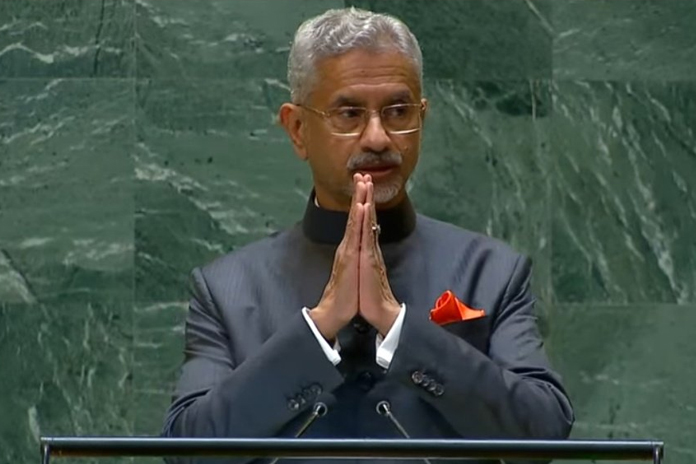As the Ukraine war drags into its third year and the Gaza conflict intensifies, India on Thursday issued a firm call for urgent solutions, cautioning the international community against being “fatalistic” about the continuation of violence. Addressing the 79th United Nations General Assembly (UNGA) in New York, External Affairs Minister S. Jaishankar highlighted the need to resolve conflicts and warned of the broader consequences of prolonged violence.
“We are gathered here at a difficult time. The world is yet to recover from the ravages of the Covid pandemic. A war in Ukraine is well into its third year. The conflict in Gaza is acquiring wider ramifications,” Jaishankar remarked during his address. His speech came at a time when both crises, in Ukraine and Gaza, have escalated, with geopolitical tensions rising globally.
Jaishankar stressed that the world cannot be passive about the persistence of violence. “The world cannot be fatalistic about the continuation of violence on a large scale, no more than be impervious to its broader consequences,” he declared, highlighting the need for the international community to seek “urgent solutions” and act upon them.
The external affairs minister reiterated India’s position that conflicts must be resolved for the sake of global peace and security, underscoring that the economic and social ramifications of these ongoing conflicts disproportionately affect the weak and vulnerable.
A call for urgent action
Jaishankar made it clear that whether it is the war in Ukraine or the conflict in Gaza, the international community is seeking immediate resolutions. He noted that the economic consequences of the crises are vast, with development plans in the Global South being derailed and Sustainable Development Goals (SDGs) slipping out of reach.
“Across the Global South, development plans have gone off rails and SDG targets are receding,” Jaishankar lamented, underlining that the ripple effects of these conflicts have extended beyond their immediate regions, disrupting economies and pushing back progress on critical global targets.
In a veiled reference to China, Jaishankar also pointed to issues related to unfair trade practices and the strategic implications of projects that violate sovereignty and territorial integrity. “Unfair trade practices threaten jobs, just as unviable projects raise debt levels. Any connectivity that flouts sovereignty and territorial integrity acquires strategic connotations, especially when it is not a shared endeavour,” he said.
Trust in the international system is eroding
The external affairs minister expressed deep concerns about the state of the international system, saying it has become fractured, polarised, and inefficient. “Conversations have become difficult; agreements even more so. This is surely not what the founders of the United Nations would have wanted of us,” Jaishankar said, reflecting on how trust among nations has eroded.
He pointed out that several countries have taken more from the international system than they have contributed, weakening the institutions meant to uphold global governance and cooperation. “Countries have extracted more from the international system than they have put into it, enfeebling it in the process,” Jaishankar remarked, calling for a restoration of balance in global interactions.
Jaishankar argued that the concentration of production in a few countries, a hallmark of the current globalisation model, has left many nations behind, particularly in terms of employment and economic stability. “Over-concentration of production has hollowed out many economies, impacting their employment and social stability,” he said, underscoring the need to democratise global production and build resilient supply chains.
Economic solutions to global challenges
In his address, Jaishankar offered potential solutions to the current economic disparities. He called for resilient supply chains, trusted digital services, and an open-source culture to promote prosperity. “Democratising global production, building resilient supply chains, ensuring trusted digital services, and espousing an open-source culture, all these promote widespread prosperity,” he emphasised, pointing out that these measures could help in addressing the inequalities created by the current model of globalisation.
Upholding the principles of the United Nations
Jaishankar also took the opportunity to highlight the importance of upholding the principles of the United Nations, particularly the respect for international law and global commitments. He noted that if the world is to ensure security and stability, those in leadership positions must set the right example.
“The U.N. is a testimony to the agreed principles and shared objectives of the world order, and respect for international law and commitments are among the foremost in that regard,” Jaishankar stated. He further emphasised that violations of the U.N.’s basic tenets cannot be ignored. “If we are to ensure global security and stability, then it is essential that those who seek to lead, set the right example. Nor can we countenance egregious violations of our basic tenets,” he said.
India’s global role
India’s call for peace comes as the country continues to assert its growing role on the global stage. The nation has maintained a balanced stance on both the Ukraine and Gaza conflicts, calling for diplomacy and dialogue to resolve disputes. At the same time, India has championed the cause of the Global South, advocating for greater attention to the needs and challenges faced by developing nations.
Jaishankar’s remarks at the UNGA reflect India’s commitment to playing a proactive role in shaping global conversations around peace, security, and development, reinforcing its position as a voice of reason in an increasingly fractured world.










